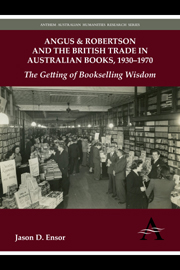 Angus & Robertson and the British Trade in Australian Books, 1930–1970
Angus & Robertson and the British Trade in Australian Books, 1930–1970 Published online by Cambridge University Press: 05 July 2013
As discussed in previous chapters, there was a two-fold rationale for Angus & Robertson to setup a London office. One goal was to secure British and American titles; the other was to sell Australian books in the United Kingdom. Bearing in mind that London was the centre of a massive English-language book trade that included Australia, Ferguson was concerned that authors would leave Angus & Robertson unless it offered a ‘reasonable chance of distribution in the big overseas English-speaking markets’. When new Angus & Robertson managing director Walter Burns announced in 1960 that ‘publishing in London was finished’, not surprisingly this galvanised opposition to his ‘Napoleonic’ management and merchandising principles (discussed further in the next chapter). Just a year earlier, Angus & Robertson's Sydney office had resigned from the Australian Booksellers Association over an attempted resolution that ‘no bookseller who was also a publisher could hold any executive office in the A.B.A.’ Given that Angus & Robertson doubled as publishers and booksellers and had staff on the committee, Ferguson dismissed the Australian Booksellers Association in the belief that it would lose most of its ‘bargaining power’ with British publishers following his company's resignation.
To save this book to your Kindle, first ensure [email protected] is added to your Approved Personal Document E-mail List under your Personal Document Settings on the Manage Your Content and Devices page of your Amazon account. Then enter the ‘name’ part of your Kindle email address below. Find out more about saving to your Kindle.
Note you can select to save to either the @free.kindle.com or @kindle.com variations. ‘@free.kindle.com’ emails are free but can only be saved to your device when it is connected to wi-fi. ‘@kindle.com’ emails can be delivered even when you are not connected to wi-fi, but note that service fees apply.
Find out more about the Kindle Personal Document Service.
To save content items to your account, please confirm that you agree to abide by our usage policies. If this is the first time you use this feature, you will be asked to authorise Cambridge Core to connect with your account. Find out more about saving content to Dropbox.
To save content items to your account, please confirm that you agree to abide by our usage policies. If this is the first time you use this feature, you will be asked to authorise Cambridge Core to connect with your account. Find out more about saving content to Google Drive.